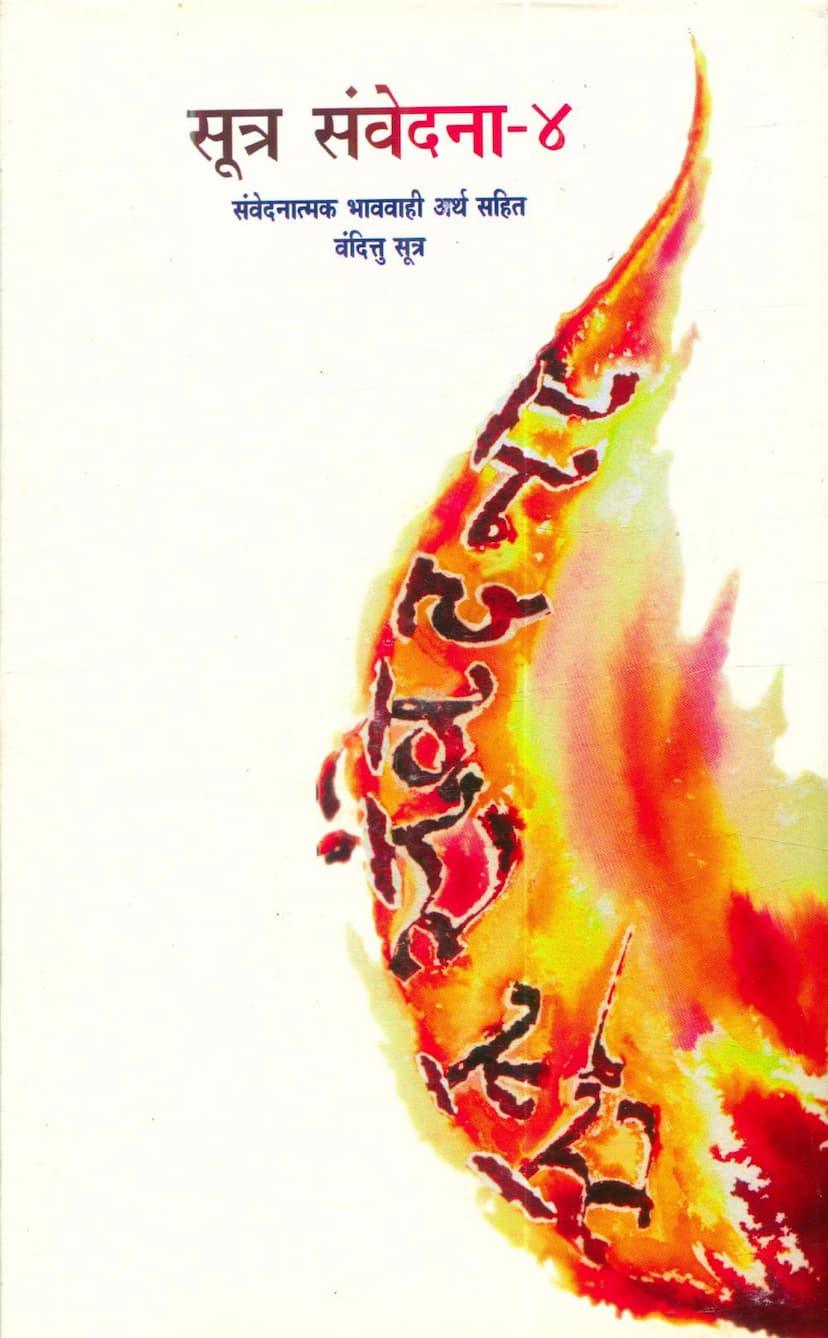Sutra Samvedana Part 04
Added to library: September 2, 2025

Summary
Based on the provided text, here is a comprehensive summary of "Sutra Samvedana Part 04 - Vandeettu Sutra":
Book Title: Sutra Samvedana Part 04 (Vandeettu Sutra) Author: Sadhviji Shri Prashamitashriji Publisher: Sanmarg Prakashan Catalog Link: https://jainqq.org/explore/006127/1
Overall Purpose: This book, "Sutra Samvedana Part 04," is the Hindi translation of the "Vandeettu Sutra," a crucial text within Jainism, specifically for householders (Shravaks). Its primary purpose is to provide a detailed, sensitive, and sentimentally evocative understanding of the "Vandeettu Sutra," which is central to the Shravak Pratikraman Sutra (the ritual of confession and repentance for householders). The goal is to enable readers to grasp the true meaning and importance of Pratikraman (repentance) and apply its principles to their lives, thereby purifying their souls and progressing towards spiritual liberation.
Key Themes and Content:
-
Understanding Pratikraman: The book emphasizes that Pratikraman is not merely reciting verses but a deep internal process of "returning" to one's true nature. It's about acknowledging and rectifying deviations caused by passions (kashayas), sensory indulgence, and negligence, leading the soul back to its pure state.
-
The "Vandeettu Sutra" Context: This volume focuses on the "Vandeettu Sutra," which deals with the Aticharas (minor transgressions or faults) of the vows taken by Shravaks. The translation aims to go beyond mere word-for-word meaning, delving into the "sentimentally evocative meaning" (samvedanatmak bhavvahi arth).
-
Sadhviji Prashamitashriji's Vision: The author, Sadhviji Shri Prashamitashriji, embarked on this project to fulfill a desire to make the profound meanings of the "Vandeettu Sutra" accessible to Hindi-speaking audiences, including monks, nuns, and lay followers. She highlights her personal journey of understanding the depths of the vows, especially the Anuvratas (minor vows), and how their purity is essential for the deeper practice of Mahavratas (major vows).
-
Structure and Content of the Vows and Transgressions:
- The book meticulously details the twelve vows of a Shravak, starting with the five Anuvratas (non-violence, truthfulness, non-stealing, chastity, non-possession).
- It then explains the three Gunavratas (Vows of Merit) that reinforce the Anuvratas: Digvrat (restricting movement), Bhogopabhogavirat (restricting enjoyment of consumables), and Anarthadandviraman (abstaining from purposeless activities).
- Finally, it covers the four Shikshavratas (Vows of Training): Samayika (equanimity), Deshavakashika (temporary restrictions), Paushadha (fasting/observing a holy day), and Atithisamvibhaga (offering food to monks).
- For each vow, the book meticulously outlines the Aticharas (transgressions/faults) – how these vows can be compromised, detailing both subtle (sukshma) and gross (badara) violations.
-
The Importance of Sentiment and Devotion: The text stresses that Pratikraman and vow observance are not mere external rituals but require deep internal sentiment (bhava). The translation aims to foster this sentiment by explaining the underlying emotional and spiritual significance of each verse and concept.
-
Role of Spiritual Guides: The author expresses gratitude to her Gurudev, Sadhviji Shri Chandrananashriji Maharaj, and others who supported this work, emphasizing the crucial role of spiritual guidance in understanding and practicing Jain principles.
-
The Text's Spiritual Goal: The ultimate aim is to help the practitioner eliminate karmas (karma-nirjara), achieve purity of consciousness, and ultimately attain liberation (moksha) by diligently practicing the teachings within the "Vandeettu Sutra" and the broader principles of Pratikraman.
-
Detailed Analysis of Vows and Aticharas: The book delves into specific transgressions for each vow. For example:
- PranaatiPaata Viraman (Non-violence): Discusses forms of violence related to cooking, farming, and the misuse of objects.
- Mrushavada Viraman (Truthfulness): Explains various types of lies, including hearsay, revealing secrets, false accusations, and misrepresentation.
- Adattadana Viraman (Non-stealing): Covers theft, receiving stolen goods, and deceptive trade practices.
- Brahmacharya Viraman (Chastity): Addresses inappropriate thoughts, glances, conversations, and physical contact with the opposite sex.
- Parigraha Pariman (Non-possession): Details excessive accumulation and attachment to wealth, property, and even sensual pleasures.
- Bhoga-Upabhoga Viraman (Restricting consumables): Discusses restrictions on food, drink, clothing, and other sensory enjoyments.
- Anartha-Danda Viraman (Abstaining from purposeless violence/activities): Explains the avoidance of activities like unnecessary travel, harmful businesses, idleness, and activities that promote negative thoughts or actions.
- Samayika, Deshavakashika, Paushadha, and Atithisamvibhaga: The text also covers the specific transgressions related to these practice-oriented vows.
-
The Process of Repentance (Pratikraman): The book outlines the components of effective Pratikraman, including:
- Aalochana (confession of faults)
- Ninda (self-reproach/criticism)
- Garha (repentance and seeking forgiveness from the Guru)
- Pratikraman (the actual ritual of repentance)
- Samayika, Chatuvishthstotra, Vandan, Pratikraman, Kayotsarga, Pratyakhyana (the six daily duties or Avashyaka).
In essence, "Sutra Samvedana Part 04 - Vandeettu Sutra" is a scholarly and devotional guide that aims to illuminate the intricate path of Shravak Pratikraman, fostering a deeper understanding and sincere practice of Jain vows for spiritual purification and ultimate liberation.